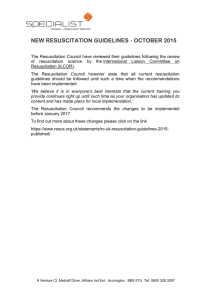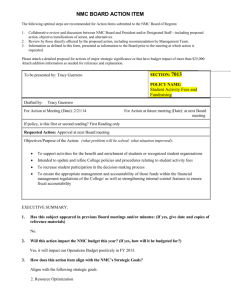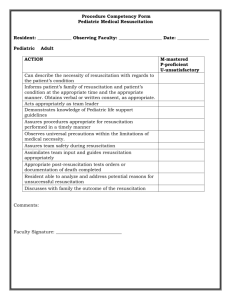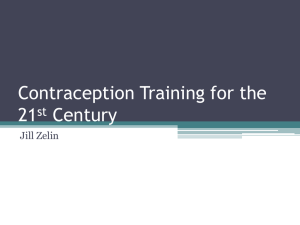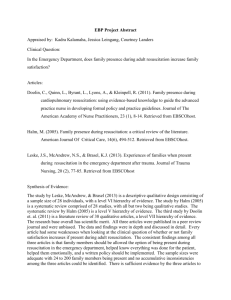Joint Statement produced by the Associate Members` Working
advertisement
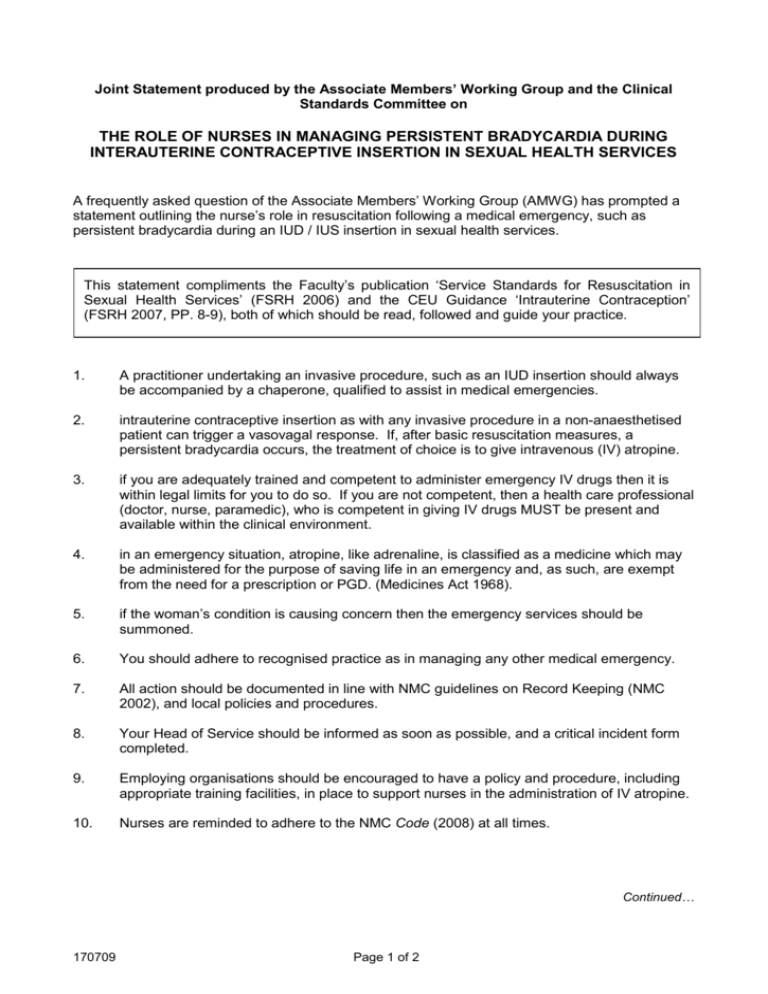
Joint Statement produced by the Associate Members’ Working Group and the Clinical Standards Committee on THE ROLE OF NURSES IN MANAGING PERSISTENT BRADYCARDIA DURING INTERAUTERINE CONTRACEPTIVE INSERTION IN SEXUAL HEALTH SERVICES A frequently asked question of the Associate Members’ Working Group (AMWG) has prompted a statement outlining the nurse’s role in resuscitation following a medical emergency, such as persistent bradycardia during an IUD / IUS insertion in sexual health services. This statement compliments the Faculty’s publication ‘Service Standards for Resuscitation in Sexual Health Services’ (FSRH 2006) and the CEU Guidance ‘Intrauterine Contraception’ (FSRH 2007, PP. 8-9), both of which should be read, followed and guide your practice. 1. A practitioner undertaking an invasive procedure, such as an IUD insertion should always be accompanied by a chaperone, qualified to assist in medical emergencies. 2. intrauterine contraceptive insertion as with any invasive procedure in a non-anaesthetised patient can trigger a vasovagal response. If, after basic resuscitation measures, a persistent bradycardia occurs, the treatment of choice is to give intravenous (IV) atropine. 3. if you are adequately trained and competent to administer emergency IV drugs then it is within legal limits for you to do so. If you are not competent, then a health care professional (doctor, nurse, paramedic), who is competent in giving IV drugs MUST be present and available within the clinical environment. 4. in an emergency situation, atropine, like adrenaline, is classified as a medicine which may be administered for the purpose of saving life in an emergency and, as such, are exempt from the need for a prescription or PGD. (Medicines Act 1968). 5. if the woman’s condition is causing concern then the emergency services should be summoned. 6. You should adhere to recognised practice as in managing any other medical emergency. 7. All action should be documented in line with NMC guidelines on Record Keeping (NMC 2002), and local policies and procedures. 8. Your Head of Service should be informed as soon as possible, and a critical incident form completed. 9. Employing organisations should be encouraged to have a policy and procedure, including appropriate training facilities, in place to support nurses in the administration of IV atropine. 10. Nurses are reminded to adhere to the NMC Code (2008) at all times. Continued… 170709 Page 1 of 2 References Faculty of Sexual and Reproductive Healthcare (2006) Service Standards for Resuscitation in Sexual Health Services, London: FSRH. http://www.ffprhc.org.uk/admin/uploads/ServiceStandardsResuscitationSHServices.pdf Faculty of Sexual and Reproductive Healthcare (2007) Intrauterine Contraception, London: FSRH. http://www.ffprhc.org.uk/admin/uploads/CEUGuidanceIntrauterineContraceptionNov07.pdf Nursing and Midwifery Council (2002) Guidelines for records and record keeping, London: NMC. http://www.nmcuk.org?aFrameDisplay.aspx?DocumentID=609 Nursing and Midwifery Council (2008) The Code. Standards of conduct, performance and ethics for nurses and midwifes, London: NMC. http://www.nmcuk.org/aFrameDisplay.aspx?DocumentID=606 Resuscitation Council (UK) (2008) Emergency treatment of anaphylactic reactions, London: Resuscitation Council (UK). http://www.resus.org.uk/pages/reaction.pdf Royal Pharmaceutical Society of Great Britain (2008) Medicines, Ethics and Practice Number 32 London: RPSGB. http://www.rpsgb.org/pdfs/MEP32s1-2a.pdf - pages 9 + 10. Statutory Instrument 1989 No. 192 (C. 6) The Medicines Act 1968 (Commencement No. 8) Order 1989, London: HMSO. http://www.opsi.gov.uk/si/si1989/Uksi_19890192_en_1.htm Statement produced June 2009 (Council July 2009) 170709 Page 2 of 2
